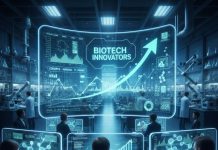Trending Now
User Outcry Forces Solend to Backtrack on its Plan to Take...
Solend had earlier indicated that it would do anything possible to prevent its system from crashing. The Crypto lender had earlier expressed...
Bitcoin Snaps Back to $69K in Short Squeeze — Analysts Warn...
Bitcoin surged back near $69,000 on Wednesday, rallying more than 10% from Tuesday's low as crypto markets staged a broad relief rally...
Oragenics Positions ONP-002 as Potential First-Ever Pharmacological Treatment for Concussion in...
Oragenics, Inc. (NYSE American: OGEN), a clinical-stage biotechnology company developing brain-targeted therapeutics through proprietary intranasal delivery technology, has laid out an ambitious...
CRYPTO NEWS
BitMEX To Launch New KYC Program
BitMEX has announced that it is launching a new mandatory KYC program on August 28. The new program will require all customers to verify...
TRENDING
LATEST REVIEWS
Hoskinsea Announces The Unveiling Of Its $HSK Token Private Sale
Hoskinsea is pleased to unveil its Token private sale. It urges persons interested to move with speed because only the early participants will benefit...
Hot Of the Press
Citius Pharmaceuticals (CTXR) Achieves Milestone: Positive Results from Mino-Lok® Phase 3...
Citius Pharmaceuticals, Inc. (NASDAQ: CTXR) announced today that its Phase 3 trial for Mino-Lok®, an antibiotic lock solution used to treat catheter-related...
STOCK NEWS
Cryptocurrency Skeptics Rejoice With the US SEC Decide to Move the Court Against Blockchain...
Nouriel Roubini is once again in the news for scouting for the demise of cryptocurrency. He aimed his latest tweets at a time when...
High Ethereum Gas Fees Side-lining Small Wallet Holders As Whales Reap
Although high gas fees on the Ethereum network are making it challenging for retail investors to interact with DeFi protocols that is...
Her Majesty’s Revenue and Customs (HMRC) Announces 2% Tax on Cryptocurrency
CryproUK has warned of a 2% crypto exchange tax that could pass to investors. The warning comes after an adjustment to Her Majesty’s Revenue...
Canadian Political Party Leader, Maxime Bernier, Pledges Allegiance to Bitcoin Ahead of Election Polls
The leader of the fastest-growing political party of Canada, Maxime Bernier, has paid his loyalty to Bitcoin and cryptocurrencies before a week of the...
Thailand’s Central Bank Prohibits The Use Of The Thai Baht
The Bank of Thailand is against the continued use of the Thai Baht, sending out a warning to all those considering turning o the...
















































